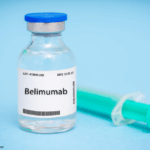Voclosporin Also Approved
In January, the FDA approved voclosporin (Lupkynis), a calcineurin inhibitor, to be used in combination with background immunosuppressive therapy to treat adults with active lupus nephritis.5,6 This treatment, which received an FDA fast track designation in 2016, was approved under priority review and is the first FDA-approved oral therapy for lupus nephritis available in the U.S.
In clinical trials, voclosporin demonstrated significantly improved renal response rates compared with mycophenolate mofetil and low-dose steroids. Voclosporin-treated patients were more than twice as likely to have a decline in their urinary protein creatinine ratio than patients on standard therapy alone. Additionally, this improvement occurred twice as fast in voclosporin-treated patients than in patients treated with standard therapy.
Background: The U.S. approval of voclosporin was based on multi-national clinical trials, including the AURORA-1 phase 3 and AURA-LV phase 2 studies.7-9 The AURORA 1 and AURA-LV studies were conducted in similar patient populations and with similar study designs.7 These were double-blind, placebo-controlled, randomized trials comparing two doses of voclosporin (23.7 mg or 39.5 mg twice daily) with patients treated with placebo combined with mycophenolate mofetil (2 grams daily), and rapidly tapered low-dose corticosteroids for induction of lupus nephritis remission. AURORA-1 was conducted over 52 weeks in 357 patients from 27 countries, while AURA-LV was conducted over 48 weeks in 265 patients from 20 countries. The primary end point in both studies was a renal response, which was defined as a urinary protein creatinine ratio of ≤0.5 mg/mg, eGFR ≥60 mL/min, no confirmed decrease from baseline in eGFR of more than 20%, less than 10 mg/d prednisone for at least eight weeks prior to end point assessment and no administration of rescue medication. The urinary protein creatinine ratio was measure in two consecutive, first-morning-void urine specimens.
In AURA-LV, the primary end point was evaluated at week 24 and week 48.8 The renal response at week 24 was attained in 32.6% (n=29) of patients who received 12.7 mg voclosporin twice daily (i.e., the low-dose group) and 27.3% (n=24) of patients who received 39.5 mg voclosporin twice daily (i.e., the high-dose group), compared with 19.3% (n=17) of patients who received placebo (OR=2.03; 95% CI 1.01–4.05; P=0.046). The statistically significant greater renal response in the patients who received low-dose voclosporin was maintained until week 48 (P<0.001 for low-dose voclosporin compared with placebo). Renal response was also significantly more common in the patients who received high-dose voclosporin than in those patients who received placebo at week 48 (P=0.046).


